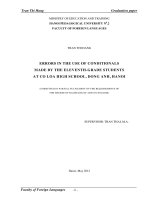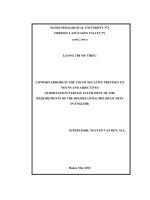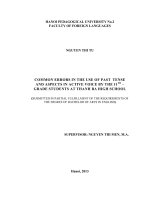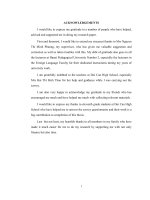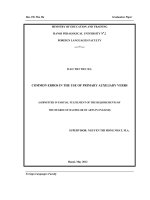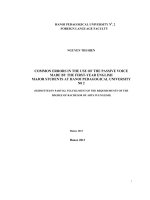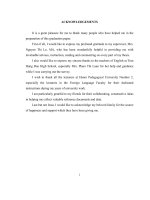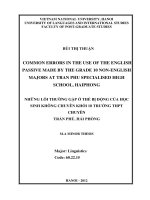Errors in the use of adverbs
Bạn đang xem bản rút gọn của tài liệu. Xem và tải ngay bản đầy đủ của tài liệu tại đây (8.86 KB, 2 trang )
Errors in the use of adverbs
Different kinds of adverbs go in different positions in a sentence. The usage is sometimes very different, too. ESL
students often find it difficult to use adverbs correctly. Here are some common mistakes in the use of adverbs.
Incorrect: He plays tennis good.
Correct: He plays tennis well.
Good is an adjective. The adverb for this meaning is well.
Incorrect: I am very much sorry.
Correct: I am very sorry.
Very is used without much before adjectives and adverbs in the positive degree.
Incorrect: I am much tired.
Correct: I am very tired.
Much does not mean the same as very.
Incorrect: She is so poor to pay the dues.
Correct: She is too poor to pay the dues.
Incorrect: It is very hot to go out.
Correct: It is too hot to go out.
Note the structure too…to.
Incorrect: She carefully drove.
Correct: She drove carefully.
Incorrect: She angrily spoke.
Correct: She spoke angrily.
Adverbs of manner usually go in the end-position.
Incorrect: The room is enough spacious for us.
Correct: The room is spacious enough for us.
The adverb enough goes after the adjective or adverb it modifies.
Incorrect: I know to swim.
Correct: I know how to swim.
Know cannot be directly followed by an infinitive. Instead we use the structure know how to.
Incorrect: He is not clever to solve the problem.
Correct: He is not clever enough to solve the problem.
Incorrect: He is now too strong to walk.
Correct: He is now strong enough to walk.
Stay on top of your writing! Download our grammar guide from www.englishgrammar.org to stay up-to-date.
Powered by TCPDF (www.tcpdf.org)
